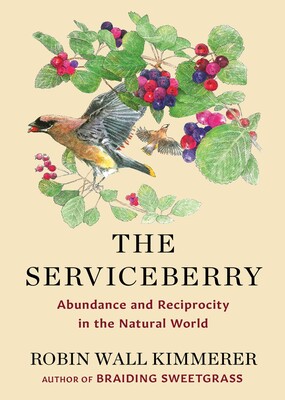
SHU Reads!
2025 Book: The Serviceberry: Abundance and Reciprocity in the Natural World

As Indigenous scientist and author of Braiding Sweetgrass Robin Wall Kimmerer harvests serviceberries alongside the birds, she considers the ethic of reciprocity that lies at the heart of the gift economy. How, she asks, can we learn from Indigenous wisdom and the plant world to reimagine what we value most? Our economy is rooted in scarcity, competition, and the hoarding of resources, and we have surrendered our values to a system that actively harms what we love. Meanwhile, the serviceberry’s relationship with the natural world is an embodiment of reciprocity, interconnectedness, and gratitude. The tree distributes its wealth—its abundance of sweet, juicy berries—to meet the needs of its natural community. And this distribution insures its own survival. As Kimmerer explains, "Serviceberries show us another model, one based upon reciprocity, where wealth comes from the quality of your relationships, not from the illusion of self-sufficiency."
As Elizabeth Gilbert writes, Robin Wall Kimmerer is "a great teacher, and her words are a hymn of love to the world." The Serviceberry is an antidote to the broken relationships and misguided goals of our times, and a reminder that "hoarding won't save us, all flourishing is mutual."
SHU Reads! Common Reading Experience
Students at Seton Hall University begin their common learning experience in the summer before their first year. Since 2003, all incoming first-year students have read a common book over the summer to introduce them to academic and student life at Seton Hall. The SHU Reads! nominated text presents a shared experience intended to foster thoughtful discussion and engagement in University Life, the first-year English classes, and throughout the academic year.
Previous Selections:
- 2024: I Never Thought of it That Way by Monica Guzman
- 2023: American Like Me: Reflections on Life Between Cultures edited by America Ferrera
- 2021 & 2022: Just Mercy: A Story of Justice and Redemption by Bryan Stevenson
- 2020: Grit: The Power of Passion and Perseverance by Angela Duckworth
- 2019: Educated by Tara Westover
- 2018: Coming of Age at the End Of Nature: A Generation Faces Living on a Changed Planet by Julie Dunlap and Susan Cohen
- 2017: Hidden Figures by Margot Lee Shetterly
- 2016: The Other Wes Moore by Wes Moore
- 2015: The Ledge by Jim Davidson and Kevin Vaughan
- 2014: Radium Girls by D.W. Gregory
- 2013: The Glass Castle by Jeannette Walls
- 2012: This I Believe
- 2011: The Immortal Life of Henrietta Lacks by Jennifer Skloot
2025 SHUReads! Essay Contest/Core English I Book Review Prompt
Write a book review of Robin Wall Kimmerer’s The Serviceberry: Abundance and Reciprocity in the Natural World. A successful essay will utilize features of book reviews discussed in the primary Core English I text, Everyone’s an Author, and in class, including:
- A clear sense of audience
- A concise summary of the plot/what the book says and does
- An evaluation of the text and the author’s argument and rhetorical choices
- A recommendation for your audience (see below regarding audience)
More specifically, be sure to consider the following, especially in your pre-writing: What did you like/dislike/find intriguing about how the author presented her solutions or techniques for dealing with one or more of the following themes/issues?
- Economics, or the economy in general
- Gift, market, and/or mixed economies in particular
- Education on the natural world; caring for the earth; humans’ relationship to nature
- Plant science (botany), soil science
- Climate crisis
- Societal ideas of individual success vs. communal success in different communities
- Anthropological, cultural, religious, community differences in approaches to abundance
- The focus on gratitude and reciprocity and “enoughness”
- Consumerism – different types of commodities
- Literary or philosophical approaches to the book or its ideas
- Other themes/issues (to be approved by instructor)
Choose one or two of the issues/features above (make sure they’re related to each other) or others approved by your professor as the focus of your review. In your review, consider how The Serviceberry either changed or reinforced your ideas about the issue/feature you’ve chosen.
Audience/Venue:
Depending on your chosen topic(s), choose a magazine, journal, blog, website, book review app, social media platform/thread, or other medium as a potential publication venue and audience for your review. Your professor may wish to approve the publication. Make sure you identify the audience of the publication (economists, anthropologists, philosophers, business professionals, literature scholars, botanists, scientists, theologians, politicians, journalists, teachers, students, others?) and purpose of the publication in some way early on in your essay.
Summary:
In short, you will write a 3-5 page analytical book review addressing the way one or two of the elements in the book address an (approved) issue/topic and why readers should or shouldn't read it based on its potential contributions to society; its handling – or mishandling – of said topics; its overall readability; and your personal insights and analysis of the book. It should end with a recommendation to the identified audience based on the subject matter chosen. You can recommend the book, or you can choose to say you do not recommend it. In the paper, you will need to refer to the book and thus must include in-text citations and a Work Cited page.
If you have any questions, please be sure to check with your instructor (especially regarding how to submit the essay for class) or Prof. Kelly Shea, Ph.D., Associate Professor of English and Director of First-Year Writing and SHUReads! committee member. Contact Prof. Shea for more information, especially regarding how to submit the essay for the SHUReads! essay contest.
If the essay is being submitted for the SHUReads! Essay Contest, the submission deadline is November 3, 2025.
To enter the SHUReads! Contest, please submit your information and essay via the form below.

